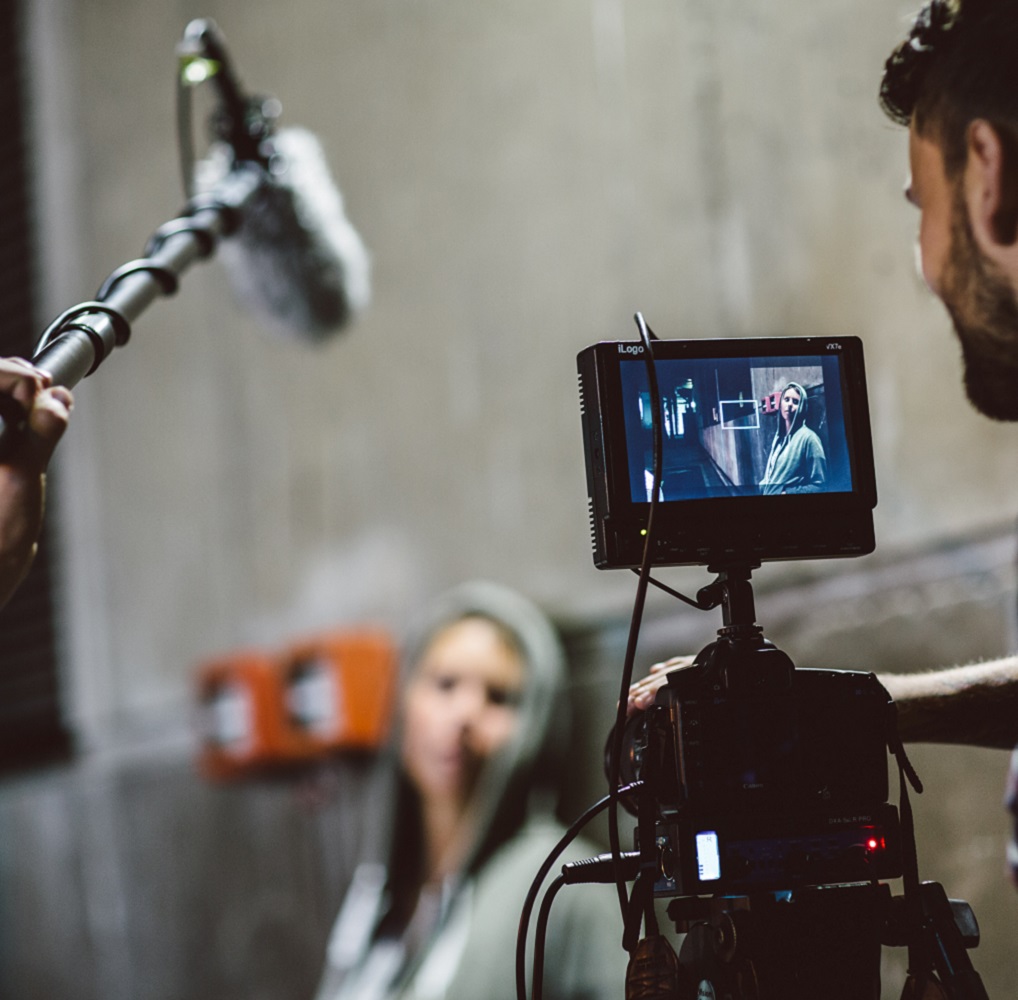
The Centre consists of a range of specialists in film and media, incorporating leading-edge scholarship and professional filmmaking. We pride ourselves on fostering synergies between scholarship and creative practice across both research and teaching, and our staff have extensive experience in the film and media industries.
Our areas of expertise include cinema of the Americas, Europe, Asia-Pacific regions, and the Arab world; documentary film and media; comparative and new media; cinema and affect; women and cinema; and human rights; as well work in feminism, psychoanalysis, and postcolonial studies.


Dr Sarah Louise Smyth, a film studies researcher at the University of Essex, has won an exclusive opportunity to be researcher-in-residence on BBC Radio 4 show Front Row. The highly competitive initiative identifies early career researchers with a passion for sharing ideas and talent for engaging public audiences through the media. Winners work with Radio 4 programme makers to bring new ideas and the latest academic scholarship to audiences.
Highlights of our research
Publications
The Pervasive and the Digital: Immersive Worlds in Four Interactive Artworks
Postfeminism, Ambivalence and the Mother in Lynne Ramsay’s We Need to Talk about Kevin
Sarah Smyth's 'Postfeminism, Ambivalence and the Mother in Lynne Ramsay’s We Need to Talk about Kevin (2011)' is out now in Film Criticism 44.1 (2020). This article argues that maternal ambivalence is used as a feminist strategy to critique post-feminist demands that mothers be blissfully happy in their mothering at all times.
The Alterity of the Image: The Distant Spectator and Films about the Syrian Revolution and War
Shohini Chaudhuri has published the article ‘The Alterity of the Image: The Distant Spectator and Films about the Syrian Revolution and War”, Transnational Cinemas vol. 9, issue 1 (2018) on Taylor Francis Online.
True Grit: Dirt, Subjectivity and the Female Body in Contemporary Westerns
Jordan Savage has published 'True Grit: Dirt, Subjectivity and the Female Body in Contemporary Westerns' in ZAA: Zeitschrift für Anglistik und Amerikanistik 68.1 (2020).
Kodachrome Travels: Colour, Realism, and the 'American Pacific' Imagination
Jeffrey Geiger has been awarded a British Academy and Leverhulme Trust Senior Research Fellowship (2021-22) for the project 'Kodachrome Travels: Colour, Realism, and the 'American Pacific' Imagination'. It also won the British Association for American Studies Founders' Research Grant (2021).
Hap-tech Narration and the Postphenomenological FIlm
Dan O'Brien has published 'Hap-tech Narration and the Postphenomenological FIlm' in Philosophies 4 (2019). The work explores the look and feel of the subjective point-of-view (POV) shot in narrative cinema, considering what David Bordwell has called the surrogate body: the concept in which viewers step into the role of an offscreen protagonist.
Spirit-Channeling in Edward FitzGerald’s Rubáiyát of Omar Khayyám
Karin Littau's article for the journal Amodern (2019) shows why and how the nineteenth-century poet Edward FitzGerald was inspired by the pre-cinematic entertainment of the Magic Lantern when he wrote the Rubáiyát of Omar Khayyám.
Intimate Media: New Queer Documentary and the Sensory Turn
Jeffrey Geiger's research on 'Intimate Media: New Queer Documentary and the Sensory Turn' is out now in Studies in Documentary Film (2019). The paper is based on a keynote presented at the conference ‘Visual Culture and Inequality’ organised by University of Konstanz and University of Texas, Austin, July 2017.
Exquisite Wonder: Colour Film, Realism, and the Yankee Voyage, 1936-38
Jeffrey Geiger's latest article on Kodachrome and colour filmmaking is available in a special issue of Journal of New Zealand and Pacific Studies, 'Photography in the Pacific', edited by Prue Ahrens, Max Quanchi, and Heather Waldroup; based on a panel at the Pacific History Association (Royal Academy London and Cambridge University, 2018).
Somaster Fiction and the Avatarial Game Body
Dan O'Brien has published his latest work on gaming: 'Somaster Fiction and the Avatarial Game Body' in Evental Aesthetics 7.1 (2018).
”In the Beginning”… an Intermedial Babel
Karin Littau has published '“In the Beginning”… an Intermedial Babel' in a special issue on Intermedialities for SubStance 44.3 (2015).
Film and Television
LIFTED
Nic Blower's latest film LIFTED was screened to a sold-out audience at the University's Lakeside Theatre on 23 July 2020.
LIFTED is a powerful documentary about war veterans with Post Traumatic Stress Disorder, and already has been screened in prisons, military barracks, and to mental health workers in the UK and the Netherlands.
His film has been selected by a number of festivals and recently won an award at the 2020 Docs Without Borders festival.
- See more about Nic Blower's work: www.nicblower.com
Mnemophrenia
Eirini Konstantinidou's Mnemophrenia (2019) won the Festival Director’s Commendation award at Boston Science Fiction film festival in 2019 and is now available around the world on various streaming platforms.
The film is a science fiction drama about three intertwining stories that explore the effects of Mnemophrenia, a new psychosis caused by Virtual Reality that blends real and artificial memories.
Events
Director’s Q&A for Ayouni (2020)
Shohini Chaudhuri hosted the online Director’s Q&A for Ayouni (2020), a documentary by Yasmin Fedda that gives a voice and visibility to the forcibly disappeared in Syria, 24 July 2020.
The Paradox of Creative Constraints
Shohini Chaudhuri curated The Paradox of Creative Constraints, a public symposium at The Mosaic Rooms, a day of film screenings and talks which brought together filmmakers, funders and human rights defenders to debate freedom of cinematic expression in the Middle East, 7 September 2019.
Shohini Chaudhuri has been awarded a Leverhulme Trust Fellowship (2019-21) for the project 'Creativity and Constraint: Contemporary Cinema in Iran and the Arab World'.
Intimacies
Jeffrey Geiger and Nic Blower hosted a postgraduate research training event featuring screenings, presentations, and masterclasses, funded by CHASE and the AHRC. 'Intimacy and Ethics in Documentary Media and the Performing Arts' was featured as part of the series of symposia, 'Intimacies', organised with Goldsmith's London and Sussex University. The event concluded with a roundtable featuring the BAFTA-winning filmmaker John Douglas (May 2015).
Postgraduate research
Postgraduate research students linked to the Centre for Film and Screen Media work on a vast range of topics, incorporating both intensive original research dissertations and creative practice projects (PaR) with dissertation.
Recent projects supervised in the Centre have included:
- ContemporarySurrealisms
- Native American Representations and Interventions in the Western Genre
- Desert Islands in Myth and Representation: Literature, Cinema, Gaming
- Cinemas of Constraints: Screening Oulipo
- Voices, Bodies, and Power in the Documentary Interview
- Sana'a: City Symphony; City in Conflict
- The Films of Paul Verhoeven in Hollywood and Beyond
- Memory, History, and Entrapment in the Temporal Gateway Film
- Deleuze, Pynchon, and the Metaphysics of Film
- Madness, Metamorphic Monsters, and Landscape in Contemporary Horror Cinema



